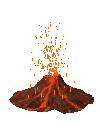
Everyone -
In class, we had a discussion to figure out the definition of "natural disaster". There are two parts: the "natural" part and the "disaster" part.
The "natural" part includes all those events that happen without people causing them, and people are unable to stop them. Even though people are a part of nature, we generally agreed that bad things that people do, like war and revolution, are not "natural" events.
The "disaster" part was a little harder to figure out. How big does a problem have to be to become a disaster? A few inches of snow that closes school for a day certainly isn't a disaster, but a blizzard that gives us two feet of snow might be. Likewise, a storm that knocks over one tree onto one person's house isn't a disaster (except to that family), but if the storm knocks over many trees into many houses, it might then be described as a disaster. In general, a disaster has to hurt or kill many people and/or cause widespread damage or destruction.
One thing we did not talk about was timing. Usually, we think of a natural disaster happening quickly, like an earthquake, hurricane, or tsunami. Just using our definition that includes only "natural" and "disaster", it would be possible for a natural disaster to happen slowly, but some people disagree with this idea. Disease is an example of a slow disaster, either an outbreak like the Spanish Flu or the plague, or a continuing happening-all-the-time disease like malaria. I want you to include disease in your worksheet of the worst disasters ever.
Remember, when you do your worksheet, fill in the first two columns first, THEN go onto the links below. Also, since disasters involve talking about many people suffering and dying, if it bothers you, please stop. I don't want you to start having nightmares!
In case you lost it, here's a copy of the worksheet. If you want to print the web browser format, set the printer to landscape (sideways) mode with a margin of 0.5 on all sides.
The link below from Wikipedia has tables showing the worst natural disasters (scroll down a little). It lists the estimated number of people that died and where & when it happened. There's lots of numbers, but I think you can figure it out. Remember that typhoon, cyclone, and hurricane are different names for the same type of storm.
Here are a few more links for your reading "pleasure" - assuming you like reading about disasters! These links may contain advertising, so be careful where you click. Each one opens in a new window, so when you're done just close it and you'll see this page again.
| CBC News This link takes you to the main story of natural disasters since 1900. The menu bar on the right side links to specific types of disasters. |
|
| Wikipedia This link shows the disasters that have hit the United States. This is not only "natural" disasters. (How do I know this?) |
|
| This link only shows the disasters that killed more than 25,000 people, and is arranged from oldest to most recent. Which of these do you think is a "natural" disaster? The ten biggest disasters are highlighted with a pink background. What's missing from the bottom of the list of disasters? |
Here are some thought questions for this week's discussion:
Talk these questions over with your family to see what they think. (There are no "right" and "wrong" answers to these questions. By asking questions like these, and then talking about them, we gain insight into how we think & feel, and how others think & feel.)
See you on Wednesday!

This page was developed and is maintained by David Dale. Fairfax County Public Schools has no responsibility for any content on this website. Contact David Dale at his personal email address: davidddale 'at' yahoo.com (note: there are 3 "d"s in the middle); please include 'Fort Hunt' in the subject line to distinguish your message from all the spam I get.
Last Update 2-March-2008